Real Life are an Australian new wave and synth-pop band that achieved international chart success with their 1983 singles "Send Me an Angel" and "Catch Me I'm Falling", both of which were taken from their debut studio album, Heartland (1983). The band originally consisted of David Sterry, Richard Zatorski, Allan Johnson (bass), and Danny Simcic (drums). Steve Williams (keyboards) replaced Zatorski in 1986, and was replaced by George Pappas in 1995 after a long hiatus of band activity.
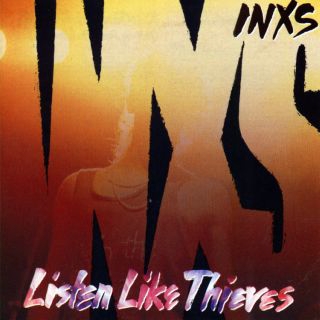
Listen Like Thieves is the fifth studio album by Australian rock band INXS. It was released on 14 October 1985. It spent two weeks at number one on the Australian Kent Music Report Albums Chart. Considered an international breakthrough album for the band, it peaked at No. 11 on the United States Billboard 200, No. 24 on the Canadian RPM 100 Albums and in the top 50 in the United Kingdom.

"Computer Games" is a song by New Zealand band Mi-Sex, released in September 1979 in Australia and New Zealand as the second single from their debut studio album, Graffiti Crimes (1979). The song peaked at number 1 in Australia and 5 in New Zealand. The music video was filmed on location at what was at the time Control Data Corporation's North Sydney centre and included gameplay from the 1979 arcade games Speed Freak, Basketball and Star Fire. The single won the award for Best Australian Single at the 1979 TV Week/Countdown Music Awards.

"Angel of the Morning" is a popular song written by Chip Taylor, originally recorded by Evie Sands but which first charted with a version by Merrilee Rush. The song has been covered by many artists including Chrissie Hynde, Dusty Springfield, P. P. Arnold, Connie Eaton, Mary Mason, Guys 'n' Dolls, Melba Montgomery, Olivia Newton-John and most recognizably by Juice Newton.

Mi-Sex is a New Zealand new wave band originally active from 1978 to 1986, and led for much of its existence by Steve Gilpin as vocalist, Kevin Stanton as guitarist and songwriter, Murray Burns as keyboardist and songwriter, and Don Martin as bassist. The group's manager for much of its career was Bob Yates. Mi-Sex achieved two top 10 hit singles in 1979-80: "Computer Games" in October 1979 and "People" in 1980. Their first two albums both reached the New Zealand top 10, Graffiti Crimes and Space Race. They were known for their cutting edge production and dynamic live shows. Gilpin died in January 1992, two months after a serious car accident from which he never recovered. Mi-Sex have periodically reformed, including in 2011 with Steve Balbi (ex-Noiseworks) on lead vocals. Stanton died on 17 May 2017, Martin on 10 August 2020.

The discography of Dead or Alive, a British dance-pop group, consists of six studio albums, seven compilation albums, twenty eight singles, and two video albums.

Space Race is the second studio album by New Zealand New Wave music group Mi-Sex, released in May 1980.The album peaked at number one on the New Zealand albums chart and was certified platinum.

Graffiti Crimes was the debut studio album by New Zealand new wave music group Mi-Sex, released in July 1979. The album peaked at number six on the New Zealand albums chart and number 16 on the Australian Kent Music Report. the album was certified Gold in New Zealand.
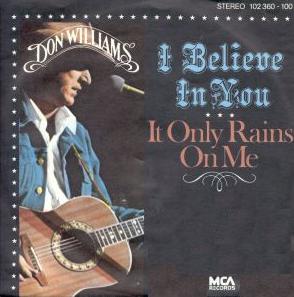
"I Believe in You" is a song written by Roger Cook and Sam Hogin, and recorded by American country music artist Don Williams. It was released in August 1980 as the first single and title track from the album I Believe in You.

Shanghaied! is the third studio album by New Zealand new wave band Mi-Sex, released in October 1981. The album peaked at number 28 on the Australian Kent Music Report.
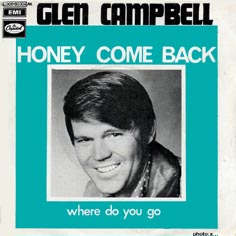
"Honey Come Back" is a song written by Jimmy Webb, and recorded by the American country music artist Glen Campbell. It would become a major hit for him.

"Maxine" is a song by New Zealand singer and songwriter Sharon O'Neill. The song was released in May 1983 as the second single from her fourth studio album, Foreign Affairs (1983). The song peaked at number 16 in Australia and New Zealand. It remain's O'Neill's highest charting single in Australia.

Where Do They Go? is the fourth studio album by New Zealand new wave band Mi-Sex, released in November 1983. The album peaked at number 80 on the Australian Kent Music Report. It would be the band's last studio album until Not from Here in 2016.
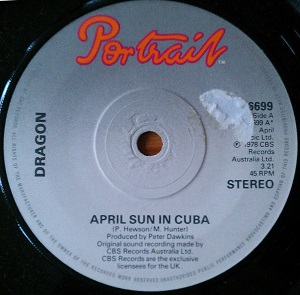
"April Sun in Cuba" is a song recorded by New Zealand group Dragon, released in October 1977. It is the first single to be released from Dragon's fourth studio album Running Free. "April Sun in Cuba" first charted on 7 November 1977, peaking at number 2 on the Kent Music Report Singles Chart and staying on the chart for 22 weeks. It also reached number 9 on the New Zealand singles chart. The b-side of the single, a non-album track called "Telephone", was credited to "Dr. Agony".
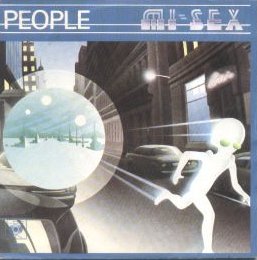
"People" is a song by New Zealand group Mi-Sex, released in March 1980 as the lead single from their second studio album, Space Race (1980). The song peaked at number 3 in New Zealand and 6 in Australia.
"But You Don't Care" is a song by New Zealand group Mi-Sex, released in June 1979 as the lead single from their debut studio album, Graffiti Crimes (1979). The song was the band's first on CBS records and became the band's first charting single, peaking at number 33 in New Zealand and 25 in Australia.
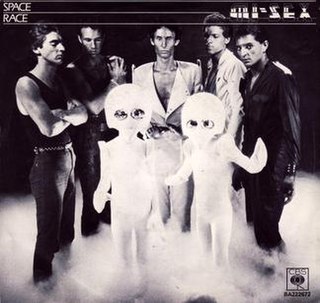
"Space Race" is a song by New Zealand group Mi-Sex, released in June 1980 as the second single from their second studio album, Space Race (1980). The song peaked at number 19 in New Zealand and 28 in Australia.

"Blue Day" is a song by New Zealand group Mi-Sex, released in February 1984 as the second single from their fourth studio album, Where Do They Go? (1983). The song peaked at number 24 in Australia.

"Castaway" is a song by New Zealand group Mi-Sex, released in May 1982. The song peaked at number 23 in Australia.

"Only Thinking" is a song by New Zealand group Mi-Sex, released in October 1983 as the lead single from their fourth studio album, Where Do They Go? (1983). The song peaked at number 48 in Australia.


















